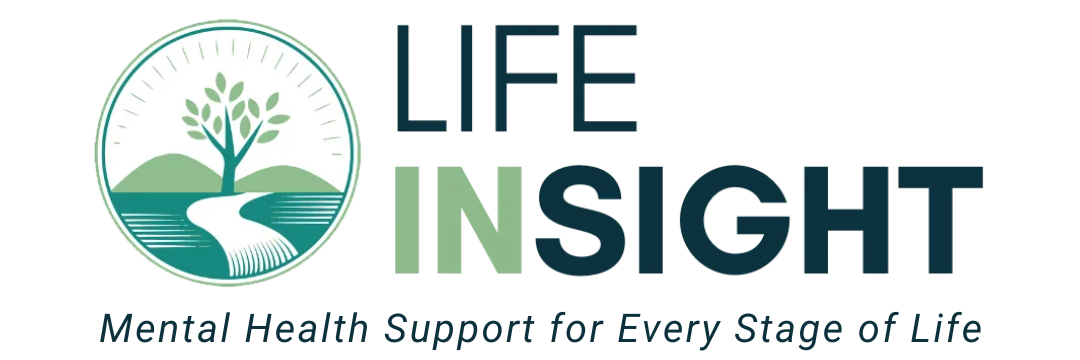It’s Okay to Ask for Help: Dealing with Anxiety and Depression as a Young Adult
Life InSight
You're Not Alone
Let’s be honest—being a young adult is no walk in the park. You’re expected to figure out your future, handle responsibilities, and somehow still “enjoy the best years of your life.” It’s a lot. And for many, that pressure turns into something heavier.
Anxiety and depression are incredibly common during this stage of life. If you’ve been feeling off, stuck, overwhelmed, or emotionally drained, you’re not imagining things—and you’re definitely not the only one. Studies show a significant rise in mental health struggles among people in their late teens and twenties.
Part of the challenge is that anxiety and depression don’t always look the way we think they will. You might find yourself feeling tired all the time, struggling to concentrate, getting irritable, or avoiding social situations. Or maybe you’re just feeling flat—like you’re going through the motions but not really present. These are all signs worth paying attention to.
Let’s Talk About Therapy—Without the Stigma
There’s still this lingering idea that therapy is only for people who’ve hit rock bottom. That it’s a last resort. But that couldn’t be further from the truth.
Therapy is for anyone who wants to better understand themselves, manage their emotions, or just talk through what they’re feeling without judgment. It’s not about fixing something “wrong”—it’s about investing in yourself.
That said, we know it’s not always easy. Whether it’s cultural expectations, fear of being seen as weak, or just not knowing where to start, there are a lot of reasons people hesitate. But here's the thing: asking for help takes strength. Real strength.
How Life InSight Helps Young Adults Like You
At Life InSight, we know everyone’s story is different. That’s why we don’t use a one-size-fits-all approach. Instead, we take time to understand what you’re going through—and what you want from therapy.
Maybe you need help managing stress. Or maybe you’re feeling lost, disconnected, or unsure of who you are right now. Whatever it is, our therapists meet you where you are, offering support that’s personalized and practical.
We use evidence-based methods like Cognitive Behavioral Therapy (CBT), but we don’t just throw jargon at you. We break things down in a way that makes sense, and together, we build a plan that fits your goals. We also offer sessions both in person and virtually—because life’s busy, and therapy should fit into it, not add more stress.
Taking That First Step
We get it—starting therapy can feel intimidating. But it doesn’t have to be a huge leap. It’s more like a conversation that begins with a simple “Hey, I could use some support.”
Here’s how it works with us:
- You reach out (call, email, or fill out a quick form on our website).
- We’ll schedule a consultation and pair you with someone who’s a good fit.
- From there, we talk. No pressure, no judgment—just a space where you can be yourself.
That first step? It’s not small. It’s a big deal. And we’re here to make it a little easier.
One Last Thing
You don’t need to have all the answers. You don’t need to have hit a breaking point. You just need to care enough about yourself to take that first step.
Life InSight is here for you. Whether you’re struggling to cope or just need someone to talk to, we’re ready when you are.
Reach out today.
We’re here to help you feel like yourself again—or maybe discover who that is for the first time.

We all know what depression looks like and feels like. It’s the inability to get out of bed in the morning, an unorganized and messy house, not being able to hold down a job or manage relationships. But depression doesn’t always look the way we expect it to. Sometimes, it looks like getting through the day — going to work, caring for others, and meeting responsibilities — while quietly struggling beneath the surface. Functional depression, often referred to as high-functioning depression, describes depression that isn’t always visible on the outside but can still create significant inner turmoil. Those with functional depression can hold down jobs, manage a household and relationships, and function relatively well on a day-to-day basis, even while feeling emotionally exhausted or disconnected inside. The keeping up of appearances can be extremely draining and difficult for the individual. You can think of functional depression like a duck gliding across a pond. On the surface, it appears as though the duck is gliding gracefully and easily. But below the surface, its feet are flailing just to stay afloat. If it takes someone without depression 5% of their energy to wash the dishes, it may take someone with functional depression many times that amount to do the same task. They will still get the task done, but the emotional toll can be enormous. Those with functional depression can have similar symptoms as someone who suffers from depression, but the difference lies in their ability to continue functioning outwardly. Feeling sad, helpless, or hopeless. Becoming disinterested in things that used to bring them joy. Changes in eating habits, like eating too much or too little. Trouble sleeping or sleeping too much. Difficulty concentrating. Negative thoughts about yourself and others. People with functional depression may feel an enormous amount of these depressive symptoms yet have become skilled at hiding or “masking” their struggles from those around them. They can create an illusion of being “fine,” even when they are not. Functioning does not mean thriving. Others with depression may not appear as high functioning in all areas of their lives. While they may seem to be excelling from your vantage point, depression may be quietly affecting areas you cannot see. Your co-worker, for example, may be excellent at her job but struggle to get out of bed on the weekends or feel overwhelmed managing personal responsibilities. Or your friend’s social media feed may be brimming with happy, smiling photos while hiding a deep sense of emptiness or disconnection. Even if you or a loved one appear to be high functioning, all depression deserves care and support. You don't have to wait until you hit rock bottom to find help. Without treatment, depression can get worse. And even when it doesn’t worsen, everyone deserves a life that doesn’t require enormous effort just to meet basic needs. The trouble is that functional depression can be hard to spot, even for yourself. So, what happens? You continue to try to keep it up. But every task demands more and more and what once felt manageable begins to feel exhausting. And eventually, burn out. If you think you or a loved one are living with functional depression, treatment is available. Life InSight offers compassionate, individualized support to help you better understand what you’re experiencing and move from simply getting by to truly feeling well.




